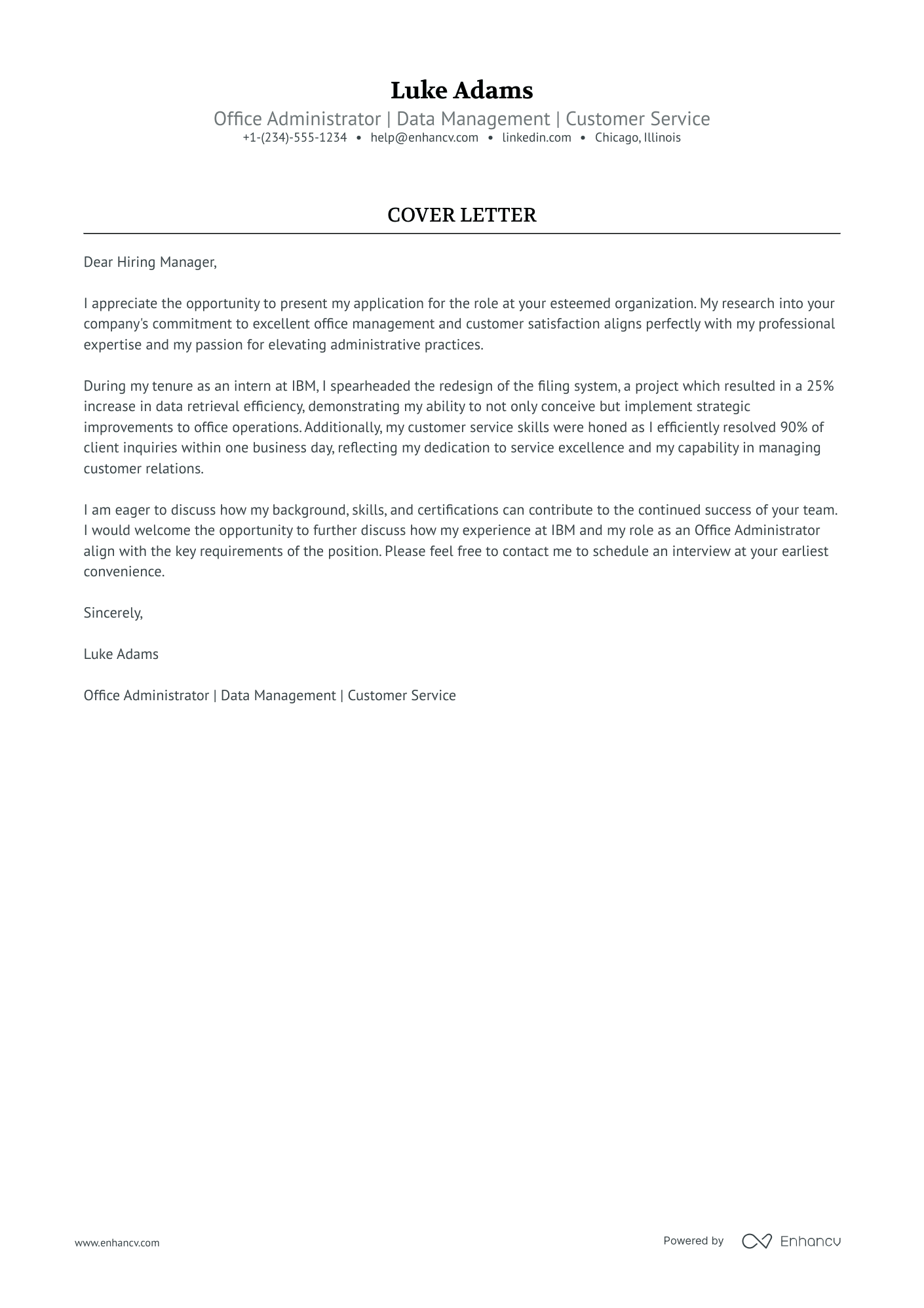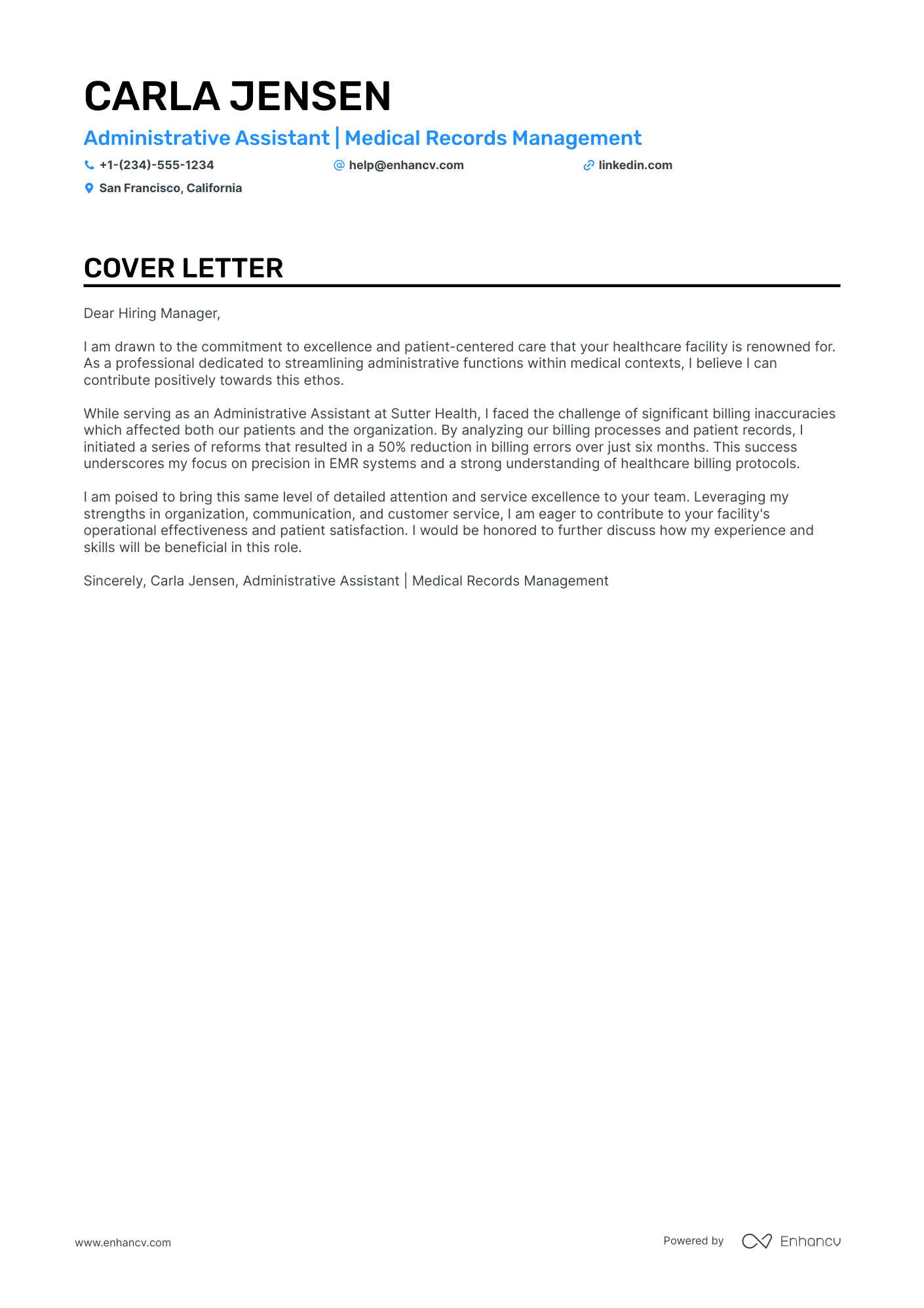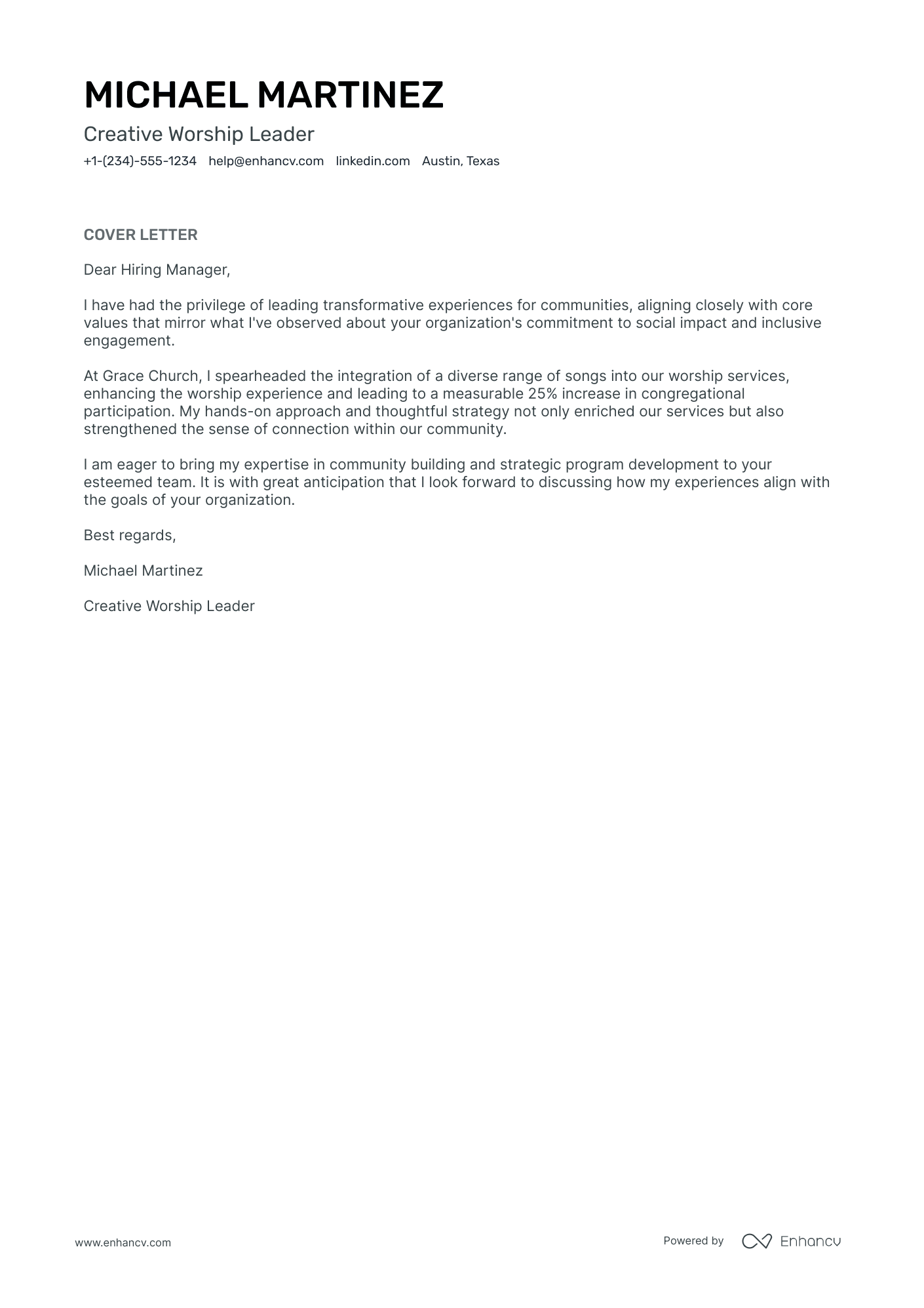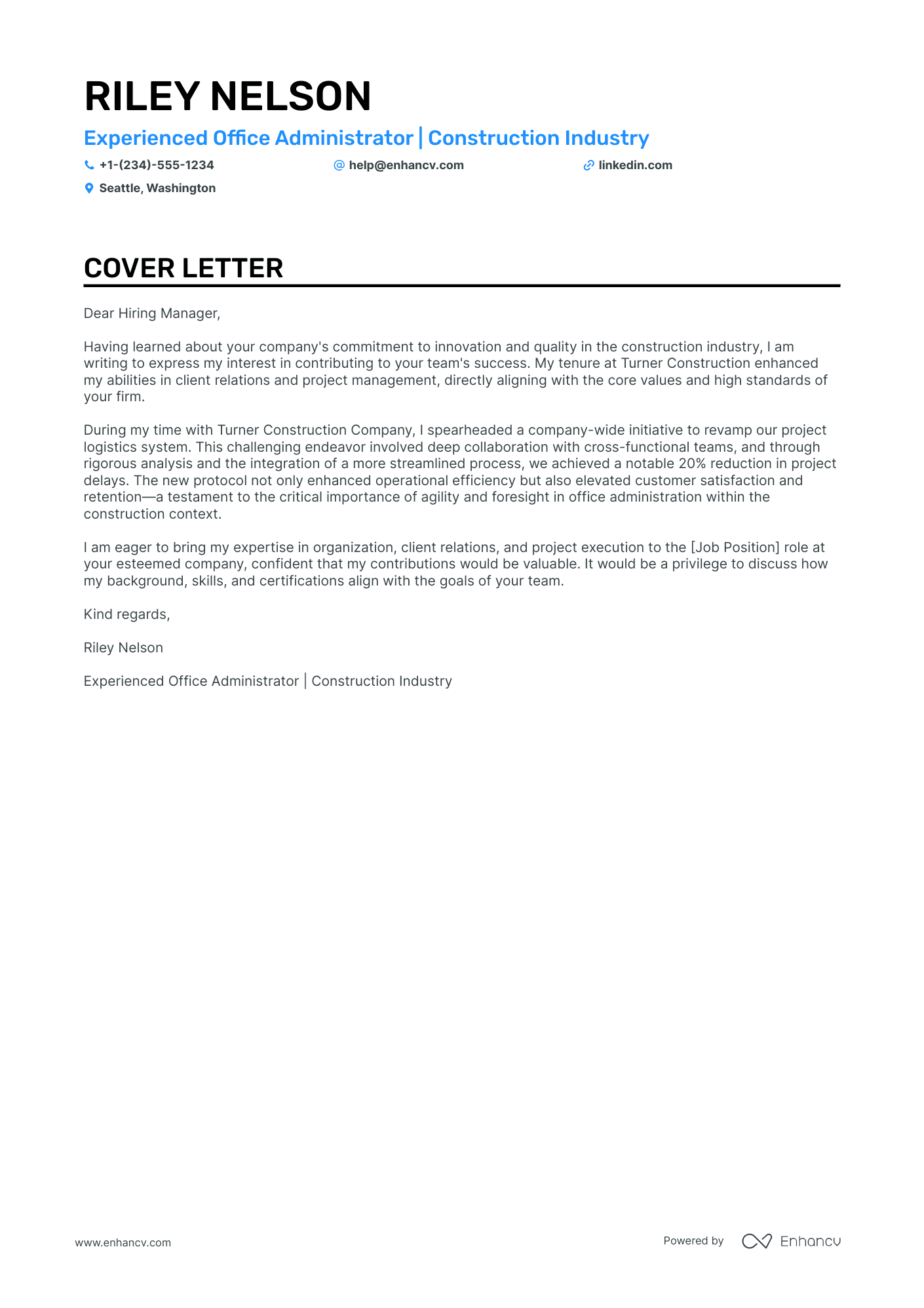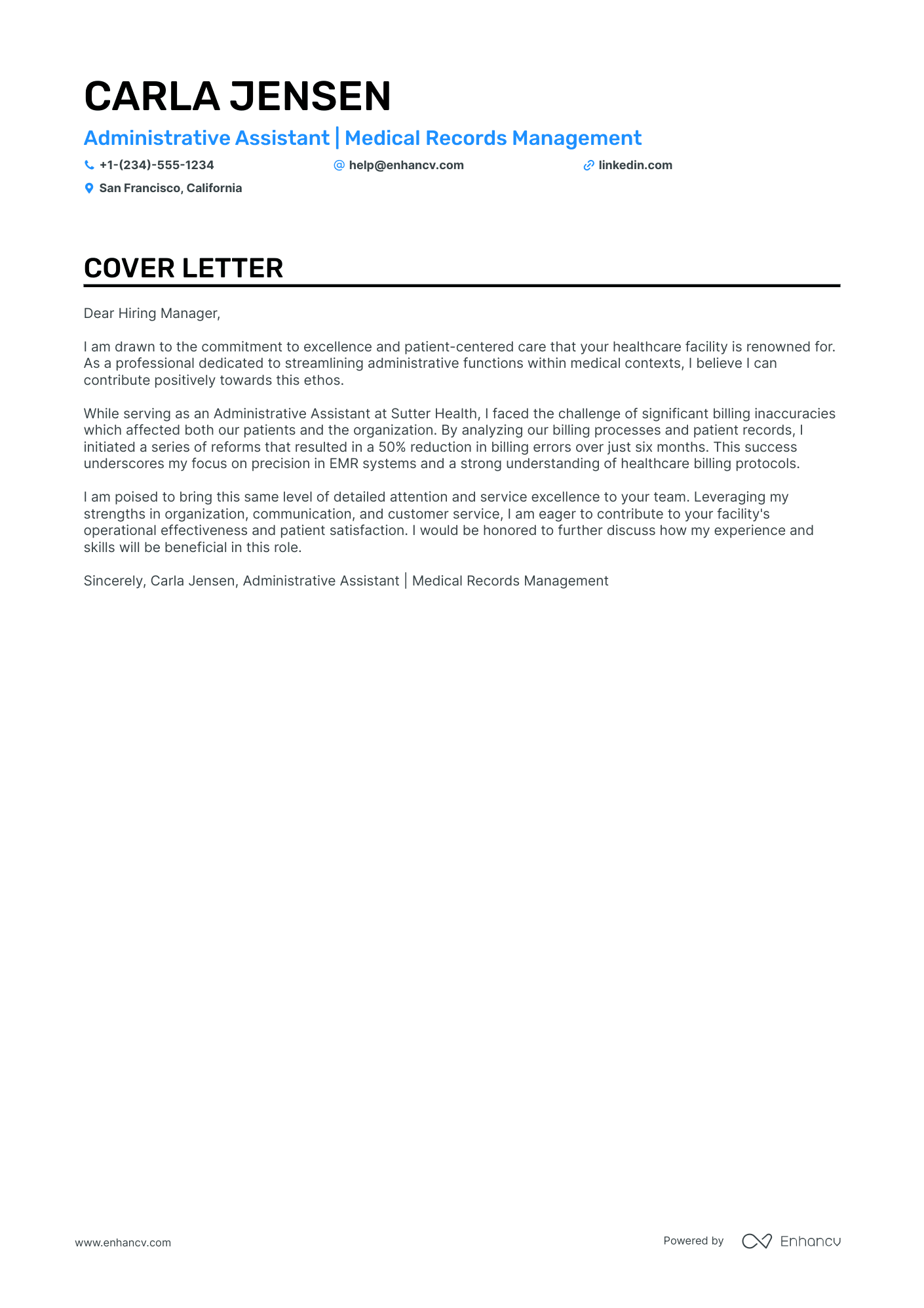Embarking on the job hunt, you've realized that mastering the office administrator cover letter is crucial. It's the golden ticket to standing out, not just another copy of your resume. Focus on your shining moment: that one achievement that turned heads. Weave it into a tale that's both formal and refreshingly free of clichés. And remember, brevity is your ally—keep it to one impactful page. Let's tackle this together and craft a cover letter you're proud to submit.
- Some inspiration from other professionals' job-winning cover letters;
- The best structure and format for your office administrator cover letter;
- Insights on how to write about your best achievement to stand out;
- A creative twist on your office administrator cover letter intro.
Upload your office administrator resume to Enhancv's AI, which will quickly scan and prepare a job-winning cover letter for you.
If the office administrator isn't exactly the one you're looking for we have a plethora of cover letter examples for jobs like this one:
Drop your resume here or choose a file.
PDF & DOCX only. Max 2MB file size.
Office administrator cover letter example
Oliver Davis
Columbus, Ohio
+1-(234)-555-1234
help@enhancv.com
- Highlighting key achievements relevant to the role: Mentioning the implementation of a robust contract management system and its impact demonstrates successful project management and problem-solving abilities, which are critical for an Office Administrator.
- Quantifying improvements and success: By providing specific metrics such as reducing paperwork by 40%, the candidate showcases their ability to deliver measurable results, which is persuasive to hiring managers.
- Alignment with the company’s values: Showing an understanding of the organization's commitment to efficiency and customer satisfaction indicates that the candidate's values and objectives are in line with those of the company, suggesting a good cultural fit.
- Direct call to action and openness for discussion: Inviting the hiring manager to a discussion about how the candidate's experience and skills can contribute to the company's success indicates readiness to engage and forward-thinking initiative.
What about your office administrator cover letter format: organizing and structuring your information
Here is one secret you should know about your office administrator cover letter assessment. The Applicant Tracker System (or ATS) won't analyze your cover letter.
You should thus focus on making an excellent impression on recruiters by writing consistent:
- Header
- Greeting
- Introduction
- Body paragraphs (and explanation)
- Promise or Call to action
- Signature (that's optional)
Now, let's talk about the design of your office administrator cover letter.
Ensure all of your paragraphs are single-spaced and have a one-inch margins on all sides (like in our cover letter templates).
Also, our cover letter builder automatically takes care of the format and comes along with some of the most popular (and modern) fonts like Volkhov, Chivo, and Bitter.
Speaking of fonts, professionals advise you to keep your office administrator cover letter and resume in the same typography and avoid the over-used Arial or Times New Roman.
When wondering whether you should submit your office administrator cover letter in Doc or PDF, select the second, as PDF keeps all of your information and design consistent.
Don’t let a busy schedule hold you back. Try our free cover letter generator and build a great letter in seconds.
The top sections on a office administrator cover letter
- Header: Include your full name, contact information, and date, which are essential for the recruiter to know who you are and how to contact you for further discussion or to schedule an interview.
- Greeting: Address the hiring manager by name if possible to personalize your cover letter and show that you have done your due diligence in researching who is responsible for hiring.
- Introduction: Present a brief but captivating introduction that specifies the office administrator position you are applying for and gives a snapshot of your relevant experience and skills.
- Body: Elaborate on your administrative skills, expertise in office management, proficiency with office technology, and any other qualifications unique to the role of an office administrator that make you the ideal candidate.
- Closing: Conclude with a strong closing statement that reiterates your enthusiasm for the position, your readiness to contribute to the team, and a courteous invitation for the recruiter to contact you to discuss your application in detail.
Key qualities recruiters search for in a candidate’s cover letter
- Excellent organizational skills: To manage office tasks effectively, such as scheduling appointments, maintaining files, and managing office supplies.
- Strong communication abilities: To interact professionally with clients, employees, and executives, and ensure clear and efficient exchange of information within the office.
- Proficiency in relevant software: To handle data management, word processing, spreadsheets, and other office-related software applications.
- Time management prowess: To prioritize and complete tasks within deadlines, while juggling multiple responsibilities.
- Attention to detail: To perform tasks with precision, from document editing to coordinating events, thus maintaining high standards and accuracy.
- Problem-solving capabilities: To address and resolve workplace issues swiftly and diplomatically, ensuring smooth office operations.
Greeting recruiters with your office administrator cover letter salutation
What better way to start your conversation with the hiring manager, than by greeting them?
Take the time to find out who the professional, recruiting for the role, is.
Search on LinkedIn, the company website. And for those still keen on making a fantastic first impression, you could even contact the organization, asking for the recruiter's name and more details about the job.
Address recruiters in the office administrator greeting by either their first name or last name. (e.g. "Dear Anthony" or "Dear Ms. Smarts").
If you're unable to discover the recruiter's name - don't go for the impersonal "To whom it may concern", but instead use "Dear HR team".
List of salutations you can use
- Dear [Hiring Manager's Name],
- Dear [Mr./Ms./Dr.] [Last Name],
- Dear Hiring Committee,
- Dear [Job Title] Hiring Team,
- Dear [Department] Department,
Get creative with your office administrator cover letter introduction
Recruiters are going to assess plenty of candidate profiles for the role. Thus, anything you do to stand out will win you brownie points.
Use your office administrator cover letter introduction to share something memorable about your experience.
But before you go down the rabbit hole of creativity and humor, align your message with the company culture.
For example, if you are applying for a role in some startup, use those first two sentences to tell a funny story (about your experience) to quickly connect with the recruiter.
What to write in the middle or body of your office administrator cover letter
Here's where it gets tricky.
Your office administrator cover letter body should present you in the best light possible and, at the same time, differ from your resume.
Don't be stuck in making up new things or copy-pasting from your resume. Instead, select just one achievement from your experience.
Use it to succinctly tell a story of the job-crucial skills and knowledge this taught you.
Your office administrator cover letter is the magic card you need to further show how any organization or team would benefit from working with you.
Final words: writing your office administrator cover letter closing paragraph
The final paragraph of your office administrator cover letter allows you that one final chance to make a great first impression.
Instead of going straight to the "sincerely yours" ending, you can back up your skills with a promise of:
- how you see yourself growing into the role;
- the unique skills you'd bring to the organization.
Whatever you choose, always be specific (and remember to uphold your promise, once you land the role).
If this option doesn't seem that appealing to you, close off your office administrator cover letter with a follow-up request.
You could even provide your availability for interviews so that the recruiters would be able to easily arrange your first meeting.
Lacking experience: here's how to write your office administrator cover letter
As a candidate with no experience, it's important to be honest from the get-go of your application.
Use your office administrator cover letter to sell your unique talents. Choose an accomplishment from your academic background or your volunteer work to show the skills that are relevant to the role.
Focus on your career objectives and how you see the job to align with them. Be specific and, at the same time, realistic about where you picture yourself in five years.
Key takeaways
Your office administrator cover letter is your best shot at standing out by showing your motivation and the unique skills you'd bring to the job:
- Chose no more than one achievement, which you'd be talking about in the body of your office administrator cover letter, by focusing on skills and outcomes;
- Address recruiters with their first or last name, or "Dear Hiring Manager" in your office administrator cover letter greeting;
- Introduce in no more than two sentences what makes your profile unique (perhaps it's your motivation, enthusiasm, or appreciation of the company you're applying for);
- Select the same font you have used in your resume (avoid Times New Roman and Arial, as most candidates tend to invest in them);
- Close your office administrator cover letter with a promise of how you see yourself growing in the company and the benefits you'd bring about.
Office Administrator cover letter examples
By Experience
Entry-Level Office Administrator
By Role
